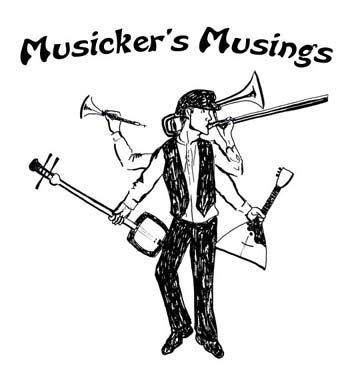
Musicker’s Musing #8: Mark Twain and the Banjo
“A gentleman is someone who knows how to play the banjo and doesn’t.”
Mark Twain
So, I guess Mark Twain didn’t enjoy the sound of banjos. Perhaps, living primarily as he did during the 1800s, Mr. Twain heard too many instruments of inferior quality and/or those which weren’t tuned properly. I, myself, enjoy the sound of the banjo. It’s hard to believe he could hear one of today’s maestros picking out melodies and still hate the sound. Yet, maybe there was just something about the sonic (twangy?) quality that affected his nervous system in an unsatisfactory way.
I’ve heard other people complain of bagpipes, clarinets, and electric guitars getting on their nerves. I don’t have any problems with the sounds coming out of those either (when in the hands/mouths of someone who knows what they’re doing).
There are a couple musical “voices” that do make me squirm a bit though. One is any of a variety of “chime-y” (dreamy?) voices chosen by some electric keyboard players. If one of these appear in a song, I feel a certain repulsion that trumps any of the quality sounds/efforts of the other musicians.
Another irksome sound for me is that of the human voice – usually a female’s – producing long vibrato pitches. I’m not sure why, but it pushes me to almost howl like a tortured dog. Yet, for other listeners it obviously brings enjoyment. Lest I come across as a misogynist, I will submit that there are several arena-filling rock bands I won’t listen to solely because of the male singer’s voice (usually bearing a nasally quality). It would bring some devilish satisfaction to name the names of these, but I’ll refrain from besmirching any of these individual singers, lest I rain on a sonic parade you happen to enjoy.
I am willing though to pick on the singers, as a whole, that I’ve heard in the genre of Death Metal. How they choose to use their particular “instrument” is just one I can’t stand to listen to for very long. It has nothing to do with how they’re expressing themselves or what they’re singing about – it’s just that the actual sonic quality they’re manifesting causes a kind of nervous reaction in me akin to that of a jackhammer or siren. Yet, one of my best students, whose musical taste frequently overlaps my own, really enjoys the sound of these singers. What is it that makes his and my particular ears hear a sound so differently?
I think sometimes there is a tendency to think there is free will involved in music taste. In the case of sound enjoyment/repulsion, I really don’t feel like there is. I feel I’d honestly like to like all the above mentioned sounds, it’s just something in the physiology of my ear won’t let me.
It is possible psychological factors could be at play here: for example, my aversion to certain keyboard sounds could be related to associations I make with the organ music I heard during some of the tedious and dreary masses I attended in my youth. Yet that answer doesn’t feel like a satisfactory explanation of the phenomenon I’m describing here.
The Darwinist in me wants to hypothesize that the differences in our sound appreciation are more likely rooted in evolution – that perhaps it proved better for the survival of the species if individuals in the group were able to detect and/or react differently to a wide palette of sounds. But as I try to come up with reasonable examples to support this theory, any ideas feel like a stretch.
So I guess for now, I’ll just appreciate sound enjoyment/repulsion as yet another mystery of Music.
Note: For my next musing, I intend to take a completely different take on Mr. Twain’s quote.
